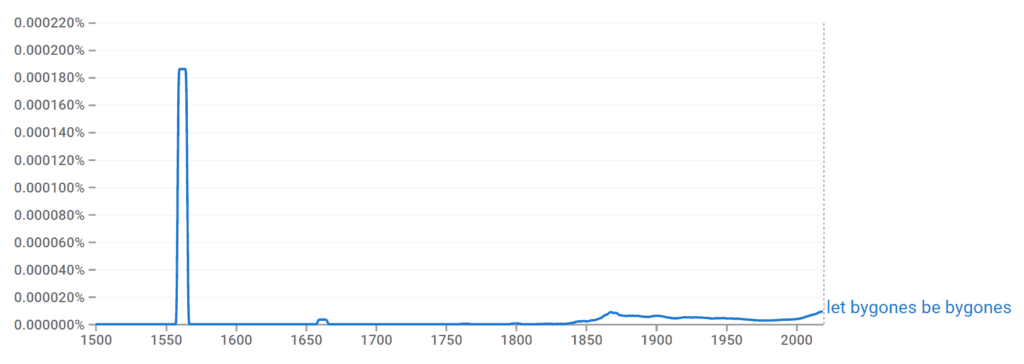You’ve heard the expression “let bygones be bygones,” but do you know what it means? Or where it comes from?
The phrase dates back at least 500 years and is meant to be used in a positive manner to help move forward from a past event. The term is an excellent way to help steer a conversation away from the negative, and learning its proper meaning and use can help influence the tone of your speech and writing.
Let Bygones be Bygones: What Does it Mean?

Let bygones be bygones is an admonition to put our differences behind us, to leave our disagreements in the past, and to go forward in friendship and cooperation.
Bygone refers to things that belong in the past. Bygones is the plural form of the word bygone and is rarely used outside of the phrase let bygones be bygones. For this reason, bygones are considered a fossil word, although you may see the singular form, bygone, used occasionally.
What is Another Phrase for Let Bygones be Bygones?
Even if you have never used the phrase let bygones be bygones, chances are you have used a saying synonymous with it. The following idioms, words, and sayings all pretty much mean the same thing:
- Bury the hatchet
- Wipe the slate clean
- Acquit
- Settle your differences
- Forgive and forget
- Absolve
- Bear no malice
- Exonerate
- Make a fresh start
These are only a few phrases and words that can be used in place of let bygones be bygones.
Origin of Let Bygones be Bygones

Let bygones be bygones is quite an old phrase that originated in the 16th Century and is found in various letters and other correspondences of the time. One of the earliest published instances of the phrase is in A Dialogue conteinyng the nomber in effect of all the Prouerbes in the Englishe tongue, by John Heywood in 1562 – meaning to leave the unpleasantness between us in the past.
Shakespeare made use of it in The Winter’s Tale, first performed in 1611, and it has continued to show up through the years along with various synonymous phrases both in formal and informal writing scenarios.
Examples of Let Bygones be Bygones in a Sentence
Up to the point of vile mistreatment, your dog is more than willing to give you the benefit of the doubt on any issue and let bygones be bygones — endlessly. (The Black Hills Pioneer)
Oasis fans have been hoping for years that the band might get back together for new shows, and you would think if anything could force Liam and Noel Gallagher to let bygones be bygones, it would be the love of Manchester. (The Independent)
“We are excited to finally be invited to the table, and it’s time to let bygones be bygones,” said Baber. (The Beckley Register-Herald)
Even if the facts bear out the complaints, we’ve demonstrated a surprising propensity to forgive entertainers on the subject of sexual harassment or sexual battery; witness the let-bygones-be-bygones attitude many music consumers took toward Chris Brown when he released a new album this spring. (The Los Angeles Times)
Let’s Review
Let bygones be bygones is an old phrase that has been in regular use since the 1500s. It means to move forward from an unpleasant event or situation and leave things in the past.
There are also many synonymous words, phrases, and idioms that mean the same thing that is used in various formal and informal publications.
